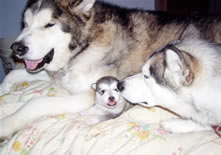Frequently Asked Questions About the
Alaskan Malamute Breed
In doing rescue for Michigan for several years, we've heard many questions over and over educating potential owners about the breed. Also, these FAQs concern many of the reasons owners ultimately give up a Malamute - they just didn't know. Here is a sample of some of the most common ones. Perhaps they are your questions too.
How can they be aggressive to other dogs and still work on a sled team?
I thought the dogs would have to get along to work together. In reading old books about the Inuit it is evident they needed to maintain strong control over the dogs to keep them from fighting. It is very common with an all Malamute team for fights to break out spontaneously. This is often what mushers refer to when they say a dog is "soft" or "hard". Hard dogs enjoy a good fight, whereas soft dogs are more tolerant of each other. Malamutes were much "harder" 20 years ago and through selective breeding and socialization, the aggression toward other dogs is less, but still evident. More so in some lines than others. Often the "hard" dogs are the most intelligent, but more difficult to live with.
Are they good with children and infants?
When raised with children, properly socialized and introduced to children and infants, they can be very tolerant, loving and protective of their own. This does not mean they will adore every child in the neighborhood, or an abusive, fearful or obnoxious child. Of course, a large dog of any breed should always be supervised around young children and children should always be taught respect for animals. Many bites to children are "dominance bites" where the parents did not teach the dog it's place in the family or the children were allowed to mistreat the dog. The dog will correct the child if the parent's won't. Also, there will be an adjustment period if you bring a new baby into the home - but handled well, the Malamute and baby will grow up to be best friends.
My spouse has a **Yorkie, Pomeranian, Poodle, etc.** but I want a REAL dog. Will they get along?
Probably not. Although I know of situations where it's worked, it is dangerous for the small dog. Any aggression on it's part may be met by like aggression from the Malamute. Guess who will win? There may not be any problems when the Malamute is young - but once it grows up and becomes an adult all it takes is one confrontation - which could be fatal to the small dog. We had a friend that had malamutes and pomeranians. They got along great for years, then someone dropped something on the floor and the pom got it first. The pom was killed instantly. Never underestimate the power of these dogs - and dogs will be dogs. It wasn't the Malamutes' fault - she was just being a dog. Size matters.
What about cats?
If raised with cats most Malamutes will get along with them fine. The mal may chase the cat, but will usually not hurt it. If not raised with cats, it may chase and kill them. Some malamutes differentiate between indoor and outdoor cats - making friends with the indoor ones, but hunting anything outdoors. The owner must teach both animals respect for one another and not let either harass or tease.
Other Critters? Birds, Ferrets, hamsters?
Other small animals such as birds, rabbits, ferrets, or gerbils are usually fine if safely caged away from the Malamute. If not raised with these animals, the Malamute may stalk them - patiently waiting for them to "escape". They will NEVER be trustworthy alone with these animals, and would probably hunt them were they to escape. .This can work, but you will need to keep the smaller animals safely caged at all times when the malamute is around. One of our puppy owners has exotic birds but also realizes that things can happen. For a long time her mal got along with the birds, even flying round the room....then ONE DAY, something changed and the mal killed one of the birds. Fortunately she knew this was a possibility, and didn't blame the malamute.. Others have had reasonable luck keeping ferrets, rabbits, hamsters, etc. with malamutes as long as they are securely caged and not allowed to be out at the same time. Our daughter had a rabbit for awhile, and while some of the malamutes were hoping it would escape and become lunch, others basically ignored it. She never got out so we never had a problem. The same daughter also had a hamster for awhile. One day while cleaning it's cage Shadow grabbed it. Only because he adored our daughter did he drop it when she yelled at him. Most would have swallowed the little critter. How much supervision do you want to put into having multiple different pets is your decision.
I want a dog that will fetch a ball and obey me. I've had German Shepherds and Dobermans so I know about owning large, dominant dogs.
Good, that is similar experience. However, do not expect your Malamute to be as obedient as other breeds. Those that are have many hours of training invested by the owner. This is not a dog well suited to being "sent out" for training either. You must do the work yourself to have a dog that respects you enough to obey. Even the best trained Malamute is not 100% reliable, and must always be walked on leash, for example. As for fetching, some like to play ball, many don't. Each is an individual and often will play games with you by bringing the ball back - just outside of your reach. How about a game of "chase me"?
I knew someone that had a Malamute when I was a child and it didn't need a fence. Why is it necessary?
Perhaps the dog you remember was old, dysplastic, obese? A puppy may be fine as a youngster, cautious to wander too far from the pack. However, a teen (8 mo.-3 years) just like a human teen will be looking for adventure and testing out his new hunting skills. A Malamute can wander miles chasing a bunny or squirrel and be unable to find his way home. He will kill and eat a neighbor's chickens, or harass livestock and other dogs. Many state laws allow a dog chasing wildlife to be shot on site! Also, it's not always the Malamute wandering away, but what wanders into your yard (such as a small neighbor dog or cat the Mal dislikes)? A good Malamute neighbor will have a good fence to keep his marauding Malamute from getting into trouble.
Can I have "pick of the litter" or choose which puppy I get?
Every litter will have a variety of personalities, some more difficult to deal with than others. It's best if the breeder chooses for you, based upon his experience with his dogs and what he knows about you and your lifestyle. The "dog experience" level of the owner is also a factor. A very active dog should not go to a home where someone will not exercise it regularly, but a more laid back personality may do just fine. "Pick of the litter" will usually be kept by the breeder or go to a trusted home where it will be shown. We have placed "show quality" dogs in Malamute homes, if that was the best home for that pup. However, there are rarely more than a couple of truly excellent show quality pups in any litter, maybe none (no matter the claims of the breeder).
Should I get 2 puppies to keep each other company?
No. The best way is to get your first dog, train it WELL, then when it's mature (2 or 3 years old) get another. It's hard enough to train one Malamute, but two is extremely difficult. Two puppies will compete for attention, may fight for dominance, and will ultimately may bond to each other rather than to you if they get along. They will be partners in crime - even if one is mellow - the more destructive puppy will likely encourage the mellow one to be included in all home destruction. Get one - train it well - and if you decide this is the breed for you, get another a couple of years later. As for breeders offering two-fer deals, that's just plain unethical in my book! Most new mal owners can barely handle one! And NEVER get two sisters or two brothers...that's just asking for dominance issues and fights, particularly if they both have pretty headstrong personalities and are from the same litter! It can occasionally work, but it takes a lot of work too - probably not what you had in mind in "keeping each other company".
Why should I stay in touch with you after I take my puppy home? I've raised a puppy before.
It's important to our breeding program to know how each and every pup turns out. Also, invariably, you will have questions raising the pup. The breeder may be able to help with them. You'll hear it over and over - Malamute pups are different! Difficult to understand until you own one, most owners of Malamutes will confirm this. They are an independent and unique breed and it's nice to know your pup is not "weird" but just like other Malamutes everywhere! A support network is a real plus with this breed. As the dog ages, it's nice to know what the brothers and sisters (or parents) are dealing with healthwise. If one of the pups has a thyroid or allergy problem, there's a good chance another might as well. It can save a lot of expensive testing if you know genetically what you may be facing if a problem develops. Also, we care and if you get a pup from us, we obviously like you and would like to be friends and want you to stay in touch.
A dog should NEVER guard it's food/growl when corrected/refuse to obey me. If it does it's a "bad" dog or is it?
No, it's not a bad dog. The owner needs training. Most Malamute pups will attempt all of these behaviors at one time, but it's up to the owner to immediately teach the pup they are not allowed behaviors. Behavior allowed to get out of control in puppyhood is very difficult (if not impossible) to undo later. Never let your mal puppy, no matter how "cute" now, do something you wouldn't want him/her to do as an adult. That might include getting on furniture, biting at arms or pant legs, growling, food guarding, - even rough growly play.
Why shouldn't my Malamute stay outside all the time? They were made for arctic weather weren't they?
Many do live outside all the time, but we feel for them. A Malamute has a very strong pack loyalty and needs to be included in family activities. When you take that pup home, you are now it's pack. It looks to you for guidance, acceptance, love, identity. A Malamute without it's pack (i.e. outside) is a lonely animal, even with a companion. They need to be near the "alpha's", presumably you. They have a strong sense of family, love people, and desperately want to be a part of your life. Unless you live outdoors all the time (not many of us do), he can never really be a part of your family if he is only a visitor inside. That is why we REQUIRE our dogs to be house Malamutes. Most Malamutes like to be outdoors and will spend a considerable about of time there, however, that doesn't mean he wants to be there all the time. Most will ask to come in often just to say "hi, what'cha doin?"
My spouse and I both work an eight-hour day and wonder if it is wise to get a Malamute puppy.
That will depend on you. Will you have the energy after a long day at work to be firm and consistent in training the puppy? (Not indulging his every whim because you feel guilty leaving him alone.) Are you willing to take him virtually everywhere you go - especially for the first 6 months? Will you take obedience classes and make the effort to socialize him properly? Also, it is difficult to be "alpha" when you aren't home much of the day. He may test your patience and resolve more. And consider lifestyle - after work do you belong to clubs or other activities that can't include a dog? Do you just want to lie in front of the TV? Many dogs left alone for long periods can be destructive to belongings, learn bad habits because no one is there to correct immediately. Potty training will go slower. He'll have a higher energy level after sleeping much of the day. If you think you can just leave him in a kennel outside while you work, think again. He may howl, dig and escape out of boredom and loneliness. Socializing him to other people, places and especially other dogs is very very necessary when most of his time is spent alone. Where will he spend all those hours? How will he eliminate when he needs to? (Small puppies can only hold it a couple of hours). You'll need to buy truckloads of interesting and safe toys, and possibly a "Malamute" for companionship (cats can be good company). If you have a plan to deal with this, and are willing to make the strong commitment a latchkey dog demands, yes, with the right puppy it can work. It will take much more effort than you ever imagined, and you should STILL find a way to be home full-time with him for at least the first 2-3 weeks. Developmentally, those weeks are VERY important in shaping the personality you'll have to live with for the next 10-15 years. In some cases, an adult dog is a better choice.
Do they make a good watch dogs?
Only if you're happy with a dog that will just do that - watch! Most Malamutes are terrible watch dogs. They are content to watch the burgler walk in and walk out. On the other hand, a few are very good watch dogs in the sense they alert you to someone at your door. They may bark "Hey, someone's here" but rarely with an aggressive tone and rarely more than once or twice. Once you and the Malamute have greeted the person the Malamute is usually content to go lie down somewhere (after getting a quick belly rub of course!). A few Malamutes (usually those that are raised improperly and encouraged to be aggressive), CAN be very territorial and protective. Sometimes unneutered males can be more protective than usual if they have a true "pack" they oversee. It goes with the alpha job. However, this is less common and not typical of the breed in a one or two dog household.
Often I get emails from potential Alaskan Malamute owners regarding raising a puppy or dealing with an adult dog. Raising a Malamute can be a challenge and sometimes a 24/7 job! But if you follow a few general rules, you will have a healthier relationship with your dog when it grows up. Always keep in mind you have about 6 months to get it right! After that it's going to take longer to un-do anything you didn't do right initially!
Can I allow my Alaskan Malamute to share my bed and still be considered alpha to him/her?
No, not for sleeping. It is ok to let him up on the bed IF you can tell him when to get off or move. If the dog gets snarly or stubborn, no more bed until the attitude improves. Feel free to get physical and PUSH them off if necessary - it's not ok to ask "fluffy get off, fluffy get off, fluffy pleaaaaaaseeee get off???" - fluffy will not respect you. Tell fluffy off once, and push her stubborn butt onto the floor!How long should I take off work to stay home with the puppy initially
The more you're home, the faster potty training will go, as well as establishing your role as pack leader. At least a couple of weeks is good, more if possible. Remember, a puppy can only hold it for as little as 2 hours for the first 2-3 months and a little longer after that. Some puppies potty train quickly, others can take up to a year to be reliable. Make sure your family is on board with the rules. If you allow the dog on the bed and another family member does not, you are going to confuse the puppy and potentially cause aggression from not being consistent. It is better to be stricter when young, than allow some behavior to get out of control (such as nipping and growling). Rule of thumb: If it's not something you want a 90 lb. malamute to do when it's an adult, don't allow it as a puppy! A snarly biting adult is not cute, though it may be cute and funny in a puppy. Correct it or you will have a snarly biting adult. Most bad habits are established in the first 6 months of life.Do you recommend obedience classes for socialization purposes?
Yes, as long as the trainer does not use yanking and jerking methods. It must be 99% positive reinforcement - praise, treats, pets. Malamutes will either ace the class as a child prodegy, or embarrass you to death. Be prepared for both scenarios! (And remember, the prodegy may come home and get into tons of trouble and conveniently forget everything learned.)
Should I immediately begin bringing the puppy around other dogs to get her used to them as playmates and not enemies?
Yes, look for as many friendly dogs as you can find. Avoid aggressive dogs. Dog parks are a bad idea, since more structure is better. Some good scenarios are being supervised in a neighbor's yard, walking with other dogs on leash, or a puppy kindergarden class. Also, a Malamute should never be off leash in an unfenced area. They are totally unreliable in this way. I have a friend with many obedience titles on her Malamutes and she spent one weekend chasing them around a park because they wouldn't come. Also, make sure all shots are up to date so you don't risk catching something - obviously you must weigh risks vs. benefits and socialization is a huge benefit with a malamute!
Do you recommend free feeding or scheduled feedings?
Free feeding will cause most Alaskan Malamutes to weigh 900 lbs. They are terrible free feeders and will gorge until there is no food left. I have a couple that might be able to do it (Superman and Gracie are really picky eaters!), but most don't do well free feeding, especially with other pets in the house. Put the cat food up high, or they will eat it all. Expect starving desperate looks even if they are well fed, and many have been known to eat whole bags of dog food when it was accidentally left out (terribly dangerous, as the food can swell and they will die of bloat - within MINUTES). They are NOT starving, but will attempt to convince you they are. You must be tough. When you give a treat, give a TINY piece, not a whole biscuit. You do a dog no favors getting him fat. Curiously, it seems the fatter they get, the more they act like they are staving.
What do you feel is the most effective positive reinforcer for good behavior?
Food - occasionally praise. Mostly food. Food. And more food. Of course, the problem becomes, how do I praise a dog that is 900 lbs? You have to find something else that pushes his buttons. Food is a great reinforcer for Malamutes, but if that's all you use - you'll have an obese dog. Every single dog is different. For some dogs it is praise, others it may be a walk, a squeaky toy, or for some it is just pleasing you. You have to get to know your dog to know which buttons work best. For example, Jazzy is a sucker for attention - she likes being first to get petted and lots of praise. She loves being allowed to cuddle on the bed. She likes to feel important. That's her button. She will gladly take food of course, but it is not really as effective as attention for her. With Max it's the squeak of a squeaky toy...we can't give them to him or he'll chew them up - but he loves the sound!
How do you balance showing your dog unconditional love while at the same time maintaining your alphaness?
Make rules and stick to them, dogs don't want unconditional love - that's a people thing. Your dog wants to please you because you are the boss. So act boss-like (be confident, follow through when you ask him to do something, no wishy-washy commands). Make the rules, enforce rules, expect obedience (not that you will get it - one can only hope! LOL). He wants to serve (when he doesn't have his own plans). He doesn't want you fawning all over him for nothing. If you give unconditional love, you will never get it. Your dog must do something for every pet, every tidbit, every thing you do with him or he will think he is the alpha and never respect you. If you want to give unconditional love, give it to your kids.
How do I deal with people (and children) who are afraid of my Malamute and how should I react? (this was a very complex question but generally, the children and adult in the house had no "dog sense" and needed some guidance in diffusing a potentially dangerous situation).
One thing you must consider is that malamutes will toy with afraid or fearful people (which are often children). They have no respect for someone afraid of them, therefore will have “fun" scaring them – and if they find love nibbles terrify someone – they’ll do it all the more and it CAN escalate into full fledged aggression. (read my story about Shadow – that’s how he got screwed up – his owners’ wife was petrified of him and he milked it for all it was worth). A confident child is usually never a problem – but they pick up on every ounce of trepidation in adults or children.
A malamute is a large, powerful dog and should NEVER be unsupervised with strangers or children without an alpha in the room. Common sense. If you have any doubt at all - keep him away from kids outside your immediate family – especially fearful, shy or timid ones. A confident child will usually not elicit this response – and if he does, then I would begin to wonder what is going on with the dog. Be aware that some lines do have problems with fear biters and aggression with children. While the vast majority of malamutes are wonderful with kids, fearful ones and aggressive ones are not. Put a shy or fearful child into the mix and it’s not a good thing….A mal with it’s own children can be very different dog than a mal with strange chldren. Scared, hyper or screamy children require correction in the dog's opinion. They should not be behaving that way. You need to stop this behavior because mals that are not sure what to do with them, and in their confusion, may bite.
Also, a fearful response can escalate the problem – by freaking out and running it gives the impression something is “wrong" and may escalate the problem as well. You should always act quickly, but CALMLY and authoratively. Take the dog’s collar and remove him from a confusing situation. In other words, if the adult or child is eliciting an unfriendly or confused response from the dog - remove the dog from the situation. Do NOT wait until the dog bites or growls. Do not "wait and see" what happens if the dog is showing signs of aggression (stiff posture, ears up). If you are not sure how to react yourself in a specific situation, you need the assistance of a qualified dog behaviorist that is familiar with northern breeds. Someone that can help you react properly as well as someone that can evaluate the dog. It’s not a “bad" dog by any means, he’s behaving like all dogs do - but mishandled, you can escalate the problem.
Ok, so say we have a miixture of freaked out kid (with bad dog skills… ), confused malamute, overreactive adult… The solution is more structure. Put up a baby gate because first, this is a malamute and most people expect them to be WAAAAAY too obedient. (This person expected the dog to remain in another room with the door open and no barrier when visitors came over). Put up the gate or shut a door when visitors come to your house if your mal is not the kind that immediately rolls on it's back for a belly rub. A tall gate is really better than a solid door though because he can still see what’s going on, yet gives you a margin of safety. Expecting him to just follow rules without you present or because you expect him to is unrealistic. Once you realize this dog will love confident, friendly kids…will listen when it suits him…and will not be nice to people he doesn’t like or trust…you’ll be halfway there…
Owning an Alaskan Malamute is a step up from the average dog - it means you will need to learn more about pack behavior and hierarchy than you planned. However, the benefits are enormous. Malamutes are intelligent, funny, and a very special breed. As I get other good questions and respond, I'll post them here.








